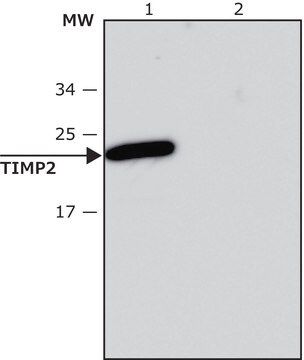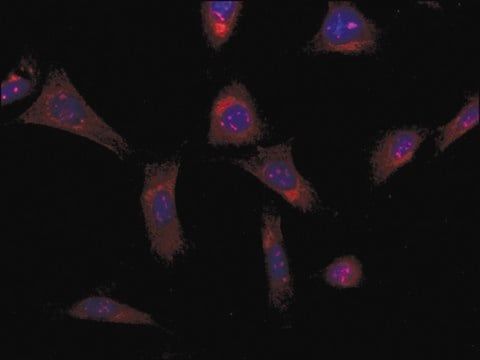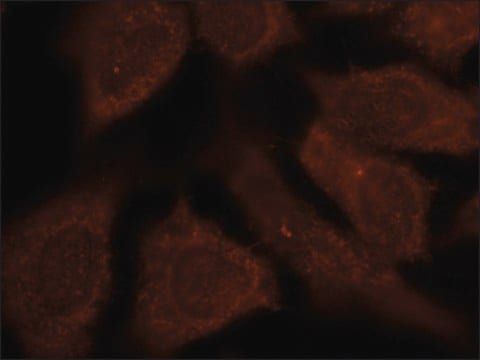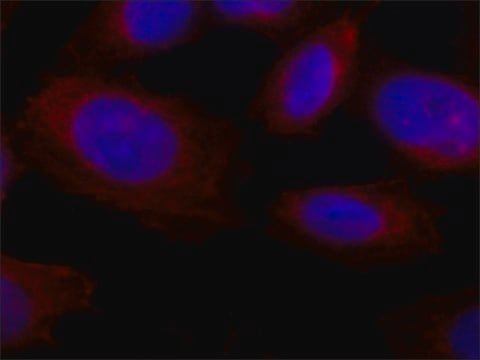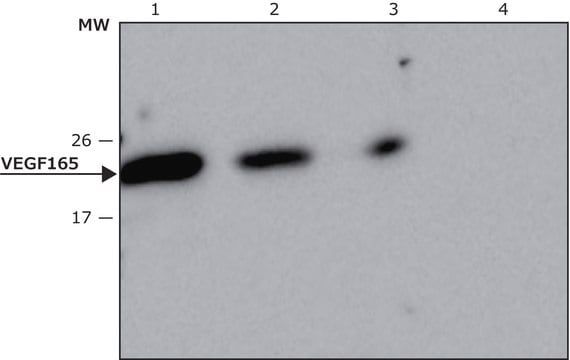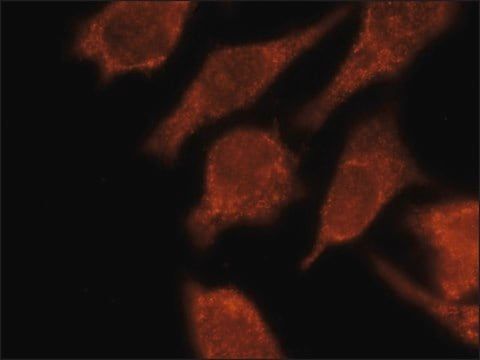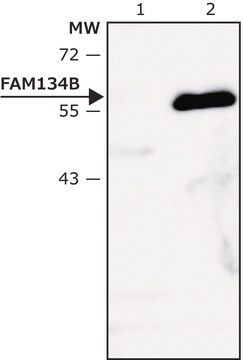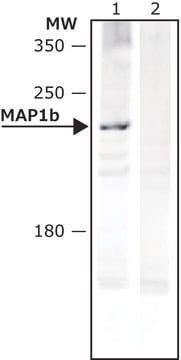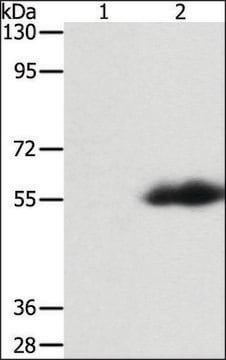SAB4200846
Anti-LC3C antibody, Mouse monoclonal
clone LC3C-37, purified from hybridoma cell culture, affinity isolated antibody
Manufacturer: Sigma Aldrich
Select a Size
| Pack Size | SKU | Availability | Price |
|---|---|---|---|
| 25 μL | SAB4200846-25-μL | In Stock | ₹ 17,793.30 |
| 100 μL | SAB4200846-100-μL | In Stock | ₹ 46,842.00 |
SAB4200846 - 25 μL
In Stock
Quantity
1
Base Price: ₹ 17,793.30
GST (18%): ₹ 3,202.794
Total Price: ₹ 20,996.094
antibody form
affinity isolated antibodypurified from hybridoma cell culture
antibody product type
primary antibodies
clone
LC3C-37, monoclonal
species reactivity
human
packaging
antibody small pack of 25 μL
concentration
~1 mg/mL
technique(s)
immunoblotting: 1-2 μg/mL using whole extracts of HEK-293T cells overexpressing human LC3C.immunofluorescence: 2.5-5 μg/mL using human HeLa cells treated with Bafilomycin A1 for autophagosomes accumulation
isotype
IgG1
UniProt accession no.
Q9BXW4
shipped in
dry ice
Description
- General description: At least 16 genes encoding for autophagy (ATG) related proteins that are required for autophagosome formation were identified in yeast by genetic screens. For many of these genes, related homologs have been identified in mammals.6 The Microtubule-associated protein light chain 3 (MAP1LC3), the mammalian homolog of yeast Atg8/Apg8/Aut7, is essential for the formation of autophagosomes.7 In addition, three human orthologs of yeast Atg8, named LC3A (MAP1LC3A), LC3B (MAP1LC3B) and LC3C (MAP1LC3C), were identified. These three human isoforms show different expression patterns in human tissues.8The LC3 protein exists in two forms, cytoplasmic LC3-I (18 kDa) and autophagosome membrane associated LC3-II (16 kDa). LC3-II is the result of LC3-I cleavage at the C-terminal Glycine by cysteine protease Atg4, which is further modified by the mammalian E1- and E2-like enzymes: Atg7 and Atg3.7 The levels of LC3-II protein correlates with the extent of autophagosome formation.3 Thus, LC3C can be used as an autophagosomal and mitophagy marker.3,7,9-11
- Specificity: Monoclonal Anti-LC3C antibody specifically human LC3C-I and/or LC3C-II and dose not cross react with human LC3A or LC3B.
- Immunogen: synthetic peptide corresponding to the N-terminal region of human LC3C, conjugated to KLH
- Application: The antibody may be used in various immunochemical techniques including Immunoblotting and Immunofluorescence. Detection of the LC3C band by Immunoblotting is specifically inhibited by the immunogen.
- Biochem/physiol Actions: Macroautophagy, usually referred to as an autophagy, is a major pathway for bulk degradation of cytoplasmic constituents and organelles. In this process, portions of the cytoplasm are sequestered into double membrane vesicles, called autophagosomes, and subsequently delivered to the lysosome for degradation and recycling.1,2 Although autophagy is a constitutive cellular event, it is enhanced under certain conditions such as starvation, hormonal stimulation and drug treatments.3 Autophagy plays an essential role in cellular differentiation, cell death and aging and is required for normal turnover of cellular components during starvation. Defective autophagy process may contribute to certain human diseases such as cancer, neurodegenerative diseases, muscular disorders and pathogen infections.4,5 Autophagy pathway is evolutionary conserved in all eukaryotic cells.
- Physical form: Supplied as a solution in 0.01 M phosphate buffered saline pH 7.4, containing 15 mM sodium azide as a preservative.
- Storage and Stability: For continuous use, store at 2-8°C for up to one month. For extended storage, freeze in working aliquots. Repeated freezing and thawing is not recommended. If slight turbidity occurs upon prolonged storage, clarify the solution by centrifugation before use. Working dilution samples should be discarded if not used within 12 hours.
- Disclaimer: Unless otherwise stated in our catalog our products are intended for research use only and are not to be used for any other purpose, which includes but is not limited to, unauthorized commercial uses, in vitro diagnostic uses, ex vivo or in vivo therapeutic uses or any type of consumption or application to humans or animals.
SAFETY INFORMATION
WGK
nwg
Compare Similar Items
Show Difference
antibody form: affinity isolated antibodypurified from hybridoma cell culture
antibody product type: primary antibodies
clone: LC3C-37, monoclonal
species reactivity: human
packaging: antibody small pack of 25 μL
concentration: ~1 mg/mL
technique(s): immunoblotting: 1-2 μg/mL using whole extracts of HEK-293T cells overexpressing human LC3C.immunofluorescence: 2.5-5 μg/mL using human HeLa cells treated with Bafilomycin A1 for autophagosomes accumulation
isotype: IgG1
UniProt accession no.: Q9BXW4
shipped in: dry ice
antibody form:
affinity isolated antibodypurified from hybridoma cell culture
antibody product type:
primary antibodies
clone:
LC3C-37, monoclonal
species reactivity:
human
packaging:
antibody small pack of 25 μL
concentration:
~1 mg/mL
technique(s):
immunoblotting: 1-2 μg/mL using whole extracts of HEK-293T cells overexpressing human LC3C.immunofluorescence: 2.5-5 μg/mL using human HeLa cells treated with Bafilomycin A1 for autophagosomes accumulation
isotype:
IgG1
UniProt accession no.:
Q9BXW4
shipped in:
dry ice
